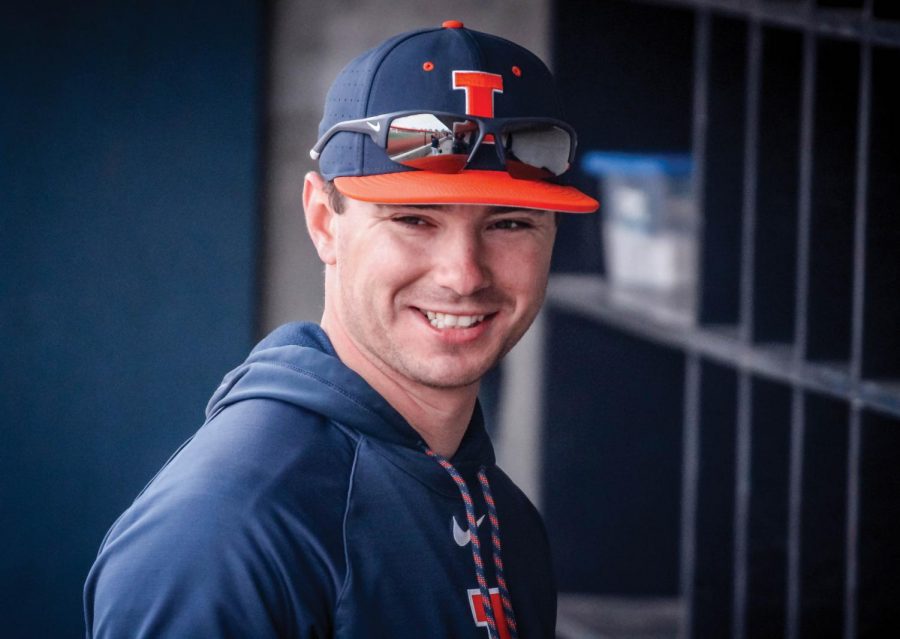Fletcher glad to give back to Illinois
Assistant coach Casey Fletcher smiles in the dugout. Fletcher played at Illinois for two seasons before a brief stint with the Frontier league.
April 26, 2018
The Fletcher family has a storied legacy within the Illinois baseball program, so it came as no surprise in 2014 when Casey Fletcher transferred to Illinois from Kankakee Community College.
His father, Darrin Fletcher, was an All-American at Illinois in the 1980s and holds the program records for both career and single-season batting average at .392 and .497, respectively. He went on to a 14-year MLB career, spending time with the Los Angeles Dodgers, Philadelphia Phillies, Montreal Expos and Toronto Blue Jays. His grandfather, Tom, held the program record for the best ERA (0.40) until 1982 and appeared in one major league game for the Tigers.
“As a little kid growing up, seeing my grandfather played here, my dad played here, I always wanted to play here,” Fletcher said. “And then I got the opportunity to play here.”
Casey, himself, also had a successful career with the Illini over two seasons, batting .318 cumulatively, racking up 126 hits, nine home runs and 60 RBI’s.
When his collegiate career came to a close after the program’s 2015 run to the NCAA Super Regional, Fletcher signed on with the Joliet Slammers of the Frontier League, where he played for two years before deciding to launch his coaching career by returning to Illinois as a volunteer assistant.
Get The Daily Illini in your inbox!
For Fletcher, returning to Illinois is his way of carrying on his family legacy.
“Stuff didn’t really work out for me going to the next level and everything,” Fletcher said. “I had some deep thinking about what my role was going to be as far as baseball goes. Everything that I’ve ever known has been baseball, and to come back and give back to a program that has given me and my family so much means a lot to me.”
At 25 years old and in his second year as a member of the coaching staff, Fletcher views himself as both a voice alongside head coach Dan Hartleb, pitching coach Drew Dickinson and hitting coach Adam Christ, but also as a bridge between the players and staff.
The former outfielder currently handles the Illini’s first base coach responsibilities, a role that consists of both technical advice and emotional counsel. Whether it’s a walk-off home run, a ground out to end a game or a simple base hit, Fletcher is always the first to come in contact with Illini players.
Managing how he interacts with sometimes jubilant and other times furious players can be difficult, but after two years on staff, Fletcher says he has a pretty good idea of how to deal with the team.
“It’s really two different sides of the spectrum, guys that have the big hit and they’re excited and they’re pumped up, and you’re the first person to see them and talk to them,” Fletcher said. “Just to be able to feel their energy of how they feel right then and there. Also, to be the guy that talks to them after something doesn’t go their way, to tell them that everything is going to be okay and to try and have a short-term memory about it.”
Fellow volunteer coach Michael Hurwitz believes Fletcher and him are able to connect well with players, especially since they both played in the program only a handful of years ago.
“They are trusting of you more than the rest of the coaching staff,” Hurwitz said. “They come to us with some of their problems in school and normal life things. We try to help them through because we’ve had that experience and we’re close in age.”
Though both Fletcher and Hurwitz maintain tight relationships with most of the team, Hartleb noted there is a certain line between coach and player that must not be crossed.
There’s a reason it’s Fletcher and Hurwitz in their positions — Hartleb trusts them.
“The thing you have to be careful of when you have young guys that leave the program (return), they’ve got to understand that they’re no longer a player and that you don’t do things socially with the players,” Hartleb said. “There’s that line in the sand, so you have to have some mature guys that can handle that because there’s just a difference. These guys, both Mike and Casey, have handled that very well. They’re very mature and they do relate very well to the players.”
In terms of on-field influence, Fletcher’s most important job is to make sure he’s always giving baserunners good advice, telling them what they need to know when they need to know it. If there’s ever a situation when he slips up or isn’t paying attention and someone leaves the bag when they shouldn’t, or misses a signal, it’s on Fletcher.
“You have to be on point at all times, especially when left-handers are on the mound,” Fletcher said. “Sometimes I do catch myself daydreaming a little bit and have to lock myself back and say, ‘Okay, hold on here, did I talk to Doran Turchin about this? Or did I talk to Yalowitz about this?’ while they’re on base. I have to snap myself back into it, because over the course of the season, you play 50-something games and it’s tough to be locked in at all times.”







